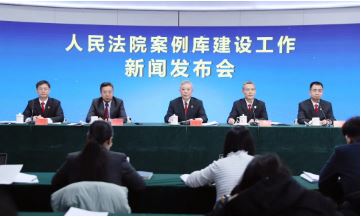China (Partially) Switches to Common Law System
On February 27, 2024 the Supreme People’s Court of China (SPC) held a press conference on the construction of the People’s Court Database and at least a partial switch to a common law system. The SPC stated that due to the limited number of guiding cases issued since 2011 (224 cases in 39 batches) the SPC established the new publicly accessible People’s Court Database having cases of precedential value. Judges must search the database and rule in alignment with similar cases in the database to avoid different rulings in cases having the same facts. Currently, there are 3711 cases in the database. It unclear though if judges and litigants will start citing cases.
Excerpts from the press conference follow.
For example, in terms of guiding cases, since 2011, the Supreme People’s Court has issued a total of 224 guiding cases in 39 batches; in terms of typical cases, in the past ten years, the Supreme People’s Court has closely followed the needs of the overall situation and served national governance, and has issued a total of typical cases. More than 2000 pieces. It can be said that the above-mentioned various cases have played a positive role in guiding judicial trials, unifying the application of laws, refining judgment standards, strengthening the publicity of the rule of law, and promoting theoretical research.
…
However, due to the long compilation cycle and relatively limited total volume, it is difficult to fully meet practical needs. In other cases, due to the lack of unified writing and review procedures and standards, the quality and authority are not fully guaranteed, and there is even a phenomenon of different verdicts for the same case, which not only brings trouble to judicial trials, but also affects the study and use of law by all walks of life. In addition, due to the lack of overall planning and unified management mechanisms, the compilation and distribution of various cases still have outstanding problems of limited coverage and insufficient systemicity, which is far from meeting the needs of judicial practice.
…
…the Supreme People’s Court decided to coordinate the management of cases and build a People’s Court case database to include authoritative cases that have been reviewed by the Supreme People’s Court and deemed to have reference and demonstration value for similar cases, including guiding cases and reference cases, to further enhance the retrieval of cases. The accuracy, recognition, strength of guidance and breadth of application maximize the practical effectiveness of cases and better serve judicial trials, public law studies, scholars’ scientific research, and lawyers’ case handling.
…
When hearing a case, the judge must search the case database and make a decision with reference to similar cases in the database. This is undoubtedly of great significance in promoting the unification of adjudication rules and standards, avoiding “different judgments in the same case”, and ensuring the correct and uniform application of the law.
The full text is available here (Chinese only). The new People’s Court database is publicly accessible here and not geoblocked but does requires registration.
Back to All Resources

